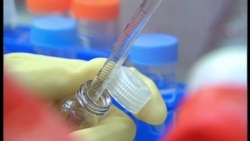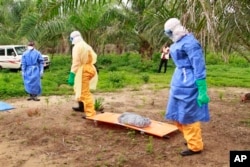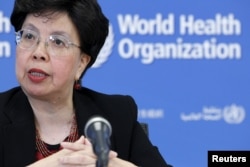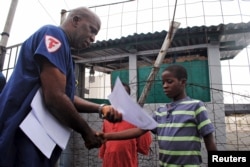Ebola experts hailed the development of a "highly effective" Ebola vaccine, but they are cautioning that widespread availability of the vaccine is still months away.
World Health Organization expert Marie-Paule Kieny told reporters that the vaccine may indeed avert major epidemics in the future, but warned that it will be a while longer before the shot is approved by regulators.
The WHO's Ebola response coordinator in Guinea, Mohammed Belhocine, said the development should be celebrated, but people should not let their guard drop yet.
And Guinea's top government response coordinator, Sakoba Keita, has expressed hope that an effective vaccine could lessen the stigma against Ebola sufferers and their families.
More study
The vaccine is expected to undergo more study before likely being used to limit the spread of the virus when a case is detected, and to protect health care workers, who are at highest risk of infection.
The World Health Organization announced Friday that the vaccine has so far been 100 percent effective in trials conducted in Guinea. The British medical journal Lancet published preliminary results and analyses.
The Ebola outbreak that swept through West Africa last year has killed more than 11,000 people, most of them in Liberia, Guinea and Sierra Leone.
Ebola is one of a number of highly dangerous viruses known as hemorrhagic fevers. There are hopes the new vaccine may be a breakthrough in combating all such diseases.
The vaccine was tested beginning in March on more than 4,000 people in Guinea who had come into close contact with the Ebola virus.
Initial results were so promising that random trials were stopped this week so everyone at risk could receive the vaccine immediately, WHO said.
Margaret Chan, WHO's general director, told reporters in Geneva that the new vaccine could be "a game changer" in the fight against Ebola outbreaks.
Researchers used a new method to test the effectiveness of the vaccine.
When what had been a generalized outbreak of Ebola expanding extremely rapidly last year switched to a series of sudden small outbreaks across the region they were able to use what they called a "ring" design in their trials.
Vaccination methods
When a first Ebola case occurred in a village, researchers vaccinated everyone in contact with the sick person.
Such "rings" of vaccination took place either immediately after an Ebola infection was confirmed or three weeks later, according to the researchers' random assignments.
Of 2,014 people vaccinated immediately, no one had contracted Ebola when tested 10 days after receiving the new drug. In the clusters where people were vaccinated three weeks later – 2,380 people – 16 people contracted the virus.
The traditional “gold standard” for testing a new drug would vaccinate half of a population at risk of contracting Ebola, while giving other people in the virus zone a placebo.
Trial data will now go to regulatory agencies to obtain a license for the vaccine which will allow it to be developed in bulk for future Ebola epidemics.
There have been a total of 27,748 cases of Ebola in Guinea, Liberia and Sierra Leone, with 11,279 reported deaths.
The outcome of many cases is not yet known, however, and the eventual full toll like will be significantly higher.









